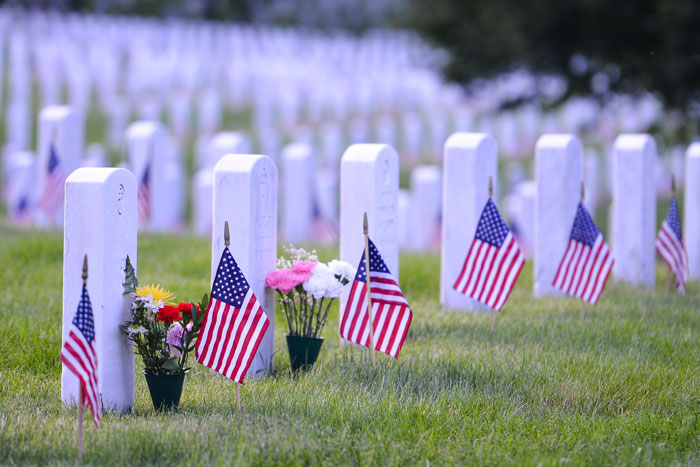Today is the 4th of July, the date that marked the United States of America’s independence from England with completion of the Declaration of Independence. Many people are out with their friends and families, have some backyard fun and eating barbecue and hot dogs, and waiting for the evening sky to come alive with the lights from nearby fireworks.
Arlington National Cemetery will also see an influx of family members coming from all over the country to pay their respects to their loved ones who paid the ultimate price for our freedoms. One thing they will not be allowed to have with them? A United States flag.
Seems like an odd item to not be allowed to bring to one of the nation’s most recognizable patriotic memorials grounds but there is a reason for this. Back in 2006, U.S. Rep. Mike D. Rogers (R-Mich.) wrote a law–38 U.S. Code § 2413–after he grew angry from witnessing mourners at the cemetery come under vicious attacks from members of the Topeka-based Westboro Baptist Church, who would chant vile comments at mourners like, “Thank God for dead soldiers,” claiming that soldiers dying was “God’s anger for the country’s tolerance of homosexuality (What Can’t, Shapiro).”
Rogers helped craft the bill, “Respect for America’s Fallen Heroes Act,” which made it illegal to protest funerals at Arlington National Cemetery or at any of the other 135 national cemeteries in the country that fall under the National Cemetery Administration. Moreover, the bill stipulates that a person may not display “any placard, banner, flag or similar device.” This would include the American flag. The one exception are the small flags that are placed at the headstones by the Arlington National Cemetery, which allows for displays as part of a funeral, memorial service, or ceremony.
The American Civil Liberties Union opposed the law, stating that it begins to raise the concern of government censorship, Lee Rowland, an ACLU lawyer, states that the bill is well-crafted and makes great efforts to avoid violating the First Amendment rights of visitors to the cemetery.
“‘In the eyes of the law both an American flag and a Nazi flag express a clear message and thus are both worthy of First Amendment protections no matter how much we may disagree with one of them,’ Rowland said. ‘It’s an all-or-nothing proposition . . . Even if the results in practice may feel unjust (What Can’t, Shapiro).'”
The law is just a tightening of other laws that are in place to help keep the cemetery looking pristine for visitors; some of which include the removal of flowers from graves once they begin to wilt and visitors are not allowed to affix items to the headstones of their loved ones, including photos of the deceased. As Joe Davis, a spokesman for the Veterans of Foreign Wars states, “There is no more patriotic and revered place in America than Arlington National Cemetery, but being a military installation, rules must still be abided by.”
For more of this story by T. Rees Shapiro of the Washington Post, click here.

